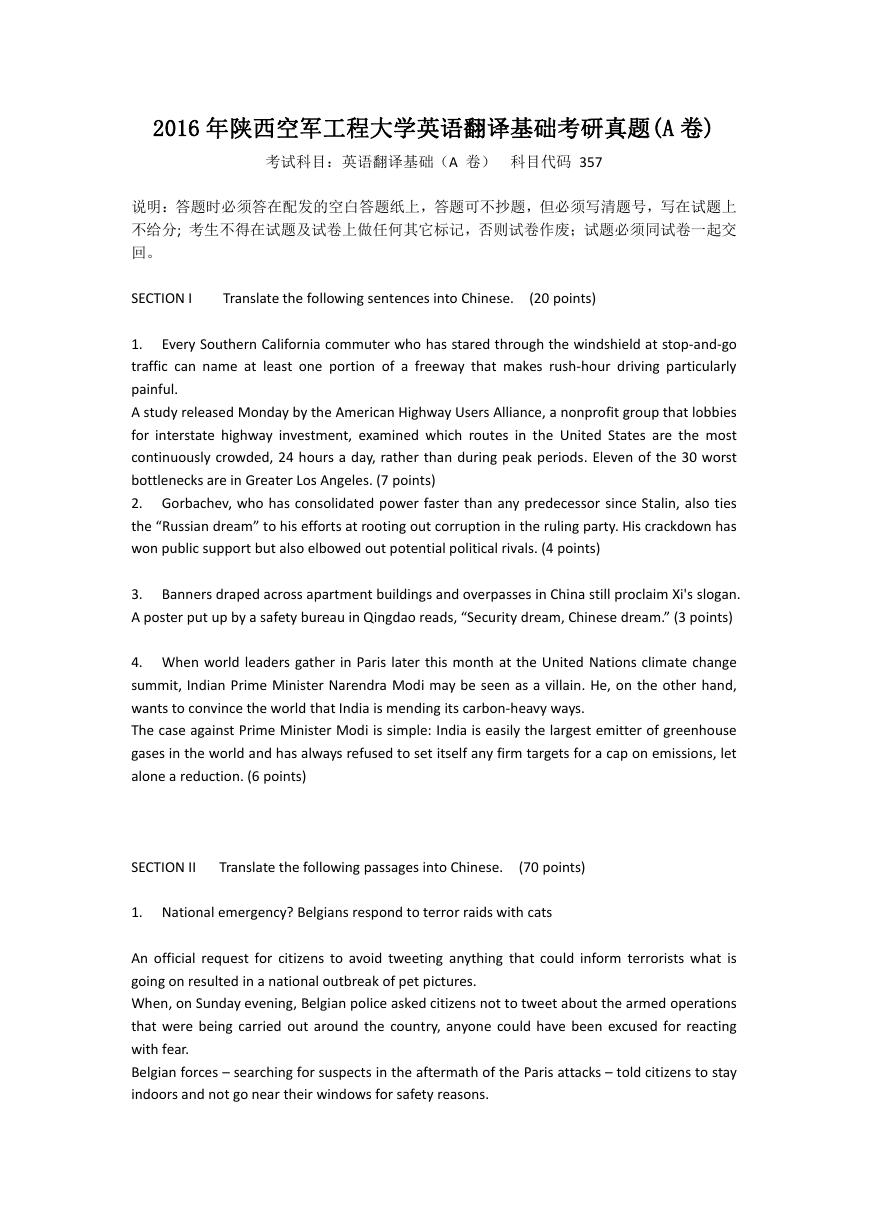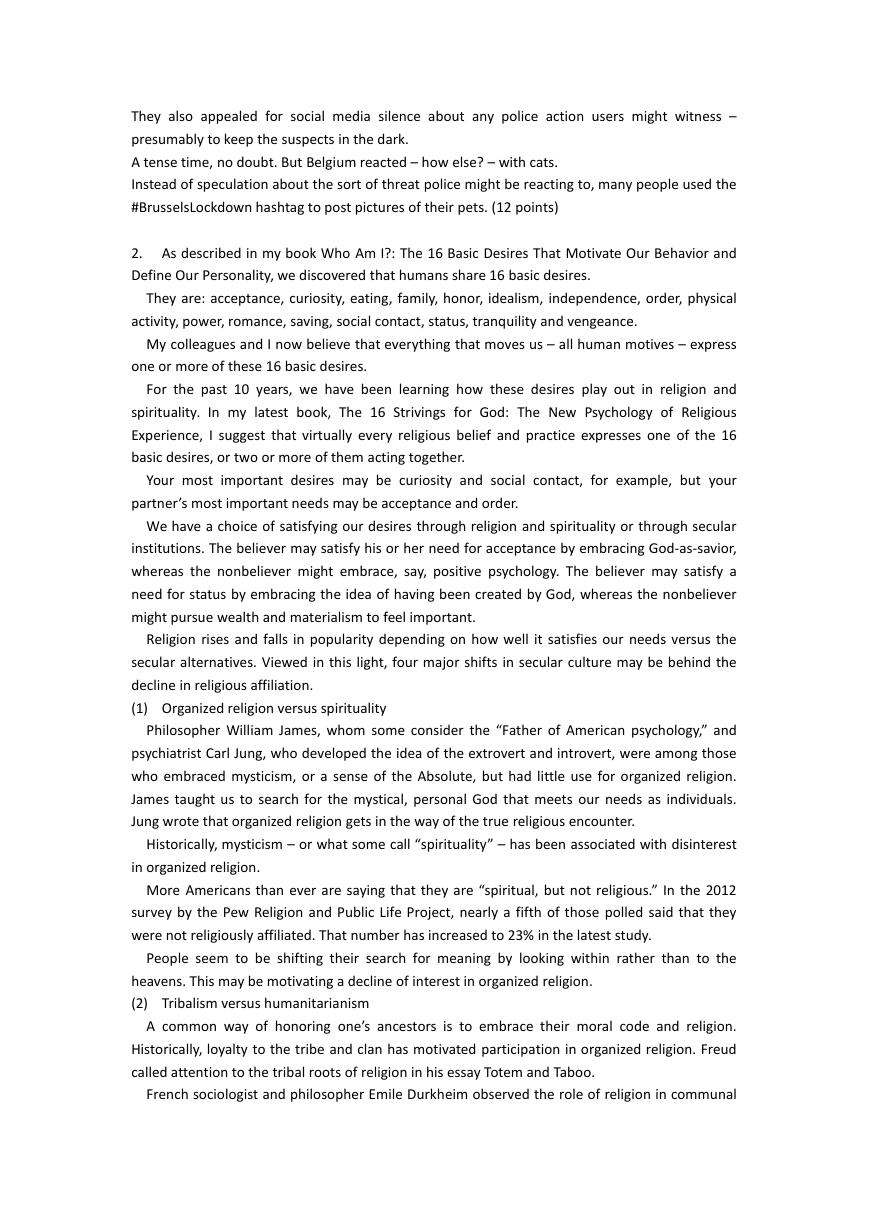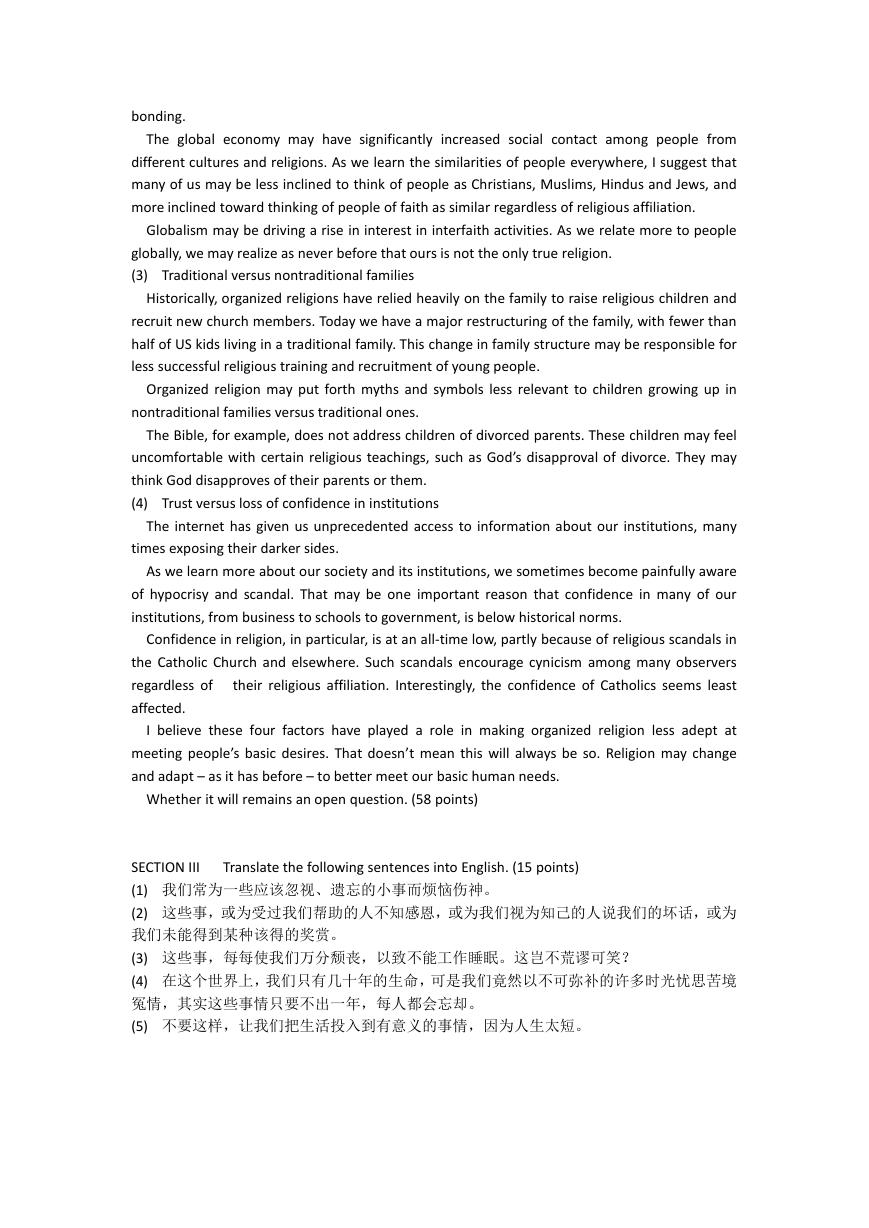2016 年陕西空军工程大学英语翻译基础考研真题(A 卷)
考试科目:英语翻译基础(A 卷) 科目代码 357
说明:答题时必须答在配发的空白答题纸上,答题可不抄题,但必须写清题号,写在试题上
不给分; 考生不得在试题及试卷上做任何其它标记,否则试卷作废;试题必须同试卷一起交
回。
SECTION I
Translate the following sentences into Chinese.
(20 points)
1.
Every Southern California commuter who has stared through the windshield at stop-and-go
traffic can name at least one portion of a freeway that makes rush-hour driving particularly
painful.
A study released Monday by the American Highway Users Alliance, a nonprofit group that lobbies
for interstate highway investment, examined which routes in the United States are the most
continuously crowded, 24 hours a day, rather than during peak periods. Eleven of the 30 worst
bottlenecks are in Greater Los Angeles. (7 points)
2. Gorbachev, who has consolidated power faster than any predecessor since Stalin, also ties
the “Russian dream” to his efforts at rooting out corruption in the ruling party. His crackdown has
won public support but also elbowed out potential political rivals. (4 points)
3.
Banners draped across apartment buildings and overpasses in China still proclaim Xi's slogan.
A poster put up by a safety bureau in Qingdao reads, “Security dream, Chinese dream.” (3 points)
4. When world leaders gather in Paris later this month at the United Nations climate change
summit, Indian Prime Minister Narendra Modi may be seen as a villain. He, on the other hand,
wants to convince the world that India is mending its carbon-heavy ways.
The case against Prime Minister Modi is simple: India is easily the largest emitter of greenhouse
gases in the world and has always refused to set itself any firm targets for a cap on emissions, let
alone a reduction. (6 points)
SECTION II
Translate the following passages into Chinese.
(70 points)
1. National emergency? Belgians respond to terror raids with cats
An official request for citizens to avoid tweeting anything that could inform terrorists what is
going on resulted in a national outbreak of pet pictures.
When, on Sunday evening, Belgian police asked citizens not to tweet about the armed operations
that were being carried out around the country, anyone could have been excused for reacting
with fear.
Belgian forces – searching for suspects in the aftermath of the Paris attacks – told citizens to stay
indoors and not go near their windows for safety reasons.
�
They also appealed for social media silence about any police action users might witness –
presumably to keep the suspects in the dark.
A tense time, no doubt. But Belgium reacted – how else? – with cats.
Instead of speculation about the sort of threat police might be reacting to, many people used the
#BrusselsLockdown hashtag to post pictures of their pets. (12 points)
As described in my book Who Am I?: The 16 Basic Desires That Motivate Our Behavior and
2.
Define Our Personality, we discovered that humans share 16 basic desires.
They are: acceptance, curiosity, eating, family, honor, idealism, independence, order, physical
activity, power, romance, saving, social contact, status, tranquility and vengeance.
My colleagues and I now believe that everything that moves us – all human motives – express
one or more of these 16 basic desires.
For the past 10 years, we have been learning how these desires play out in religion and
spirituality. In my latest book, The 16 Strivings for God: The New Psychology of Religious
Experience, I suggest that virtually every religious belief and practice expresses one of the 16
basic desires, or two or more of them acting together.
Your most important desires may be curiosity and social contact, for example, but your
partner’s most important needs may be acceptance and order.
We have a choice of satisfying our desires through religion and spirituality or through secular
institutions. The believer may satisfy his or her need for acceptance by embracing God-as-savior,
whereas the nonbeliever might embrace, say, positive psychology. The believer may satisfy a
need for status by embracing the idea of having been created by God, whereas the nonbeliever
might pursue wealth and materialism to feel important.
Religion rises and falls in popularity depending on how well it satisfies our needs versus the
secular alternatives. Viewed in this light, four major shifts in secular culture may be behind the
decline in religious affiliation.
(1) Organized religion versus spirituality
Philosopher William James, whom some consider the “Father of American psychology,” and
psychiatrist Carl Jung, who developed the idea of the extrovert and introvert, were among those
who embraced mysticism, or a sense of the Absolute, but had little use for organized religion.
James taught us to search for the mystical, personal God that meets our needs as individuals.
Jung wrote that organized religion gets in the way of the true religious encounter.
Historically, mysticism – or what some call “spirituality” – has been associated with disinterest
in organized religion.
More Americans than ever are saying that they are “spiritual, but not religious.” In the 2012
survey by the Pew Religion and Public Life Project, nearly a fifth of those polled said that they
were not religiously affiliated. That number has increased to 23% in the latest study.
People seem to be shifting their search for meaning by looking within rather than to the
heavens. This may be motivating a decline of interest in organized religion.
(2) Tribalism versus humanitarianism
A common way of honoring one’s ancestors is to embrace their moral code and religion.
Historically, loyalty to the tribe and clan has motivated participation in organized religion. Freud
called attention to the tribal roots of religion in his essay Totem and Taboo.
French sociologist and philosopher Emile Durkheim observed the role of religion in communal
�
bonding.
The global economy may have significantly increased social contact among people from
different cultures and religions. As we learn the similarities of people everywhere, I suggest that
many of us may be less inclined to think of people as Christians, Muslims, Hindus and Jews, and
more inclined toward thinking of people of faith as similar regardless of religious affiliation.
Globalism may be driving a rise in interest in interfaith activities. As we relate more to people
globally, we may realize as never before that ours is not the only true religion.
(3) Traditional versus nontraditional families
Historically, organized religions have relied heavily on the family to raise religious children and
recruit new church members. Today we have a major restructuring of the family, with fewer than
half of US kids living in a traditional family. This change in family structure may be responsible for
less successful religious training and recruitment of young people.
Organized religion may put forth myths and symbols less relevant to children growing up in
nontraditional families versus traditional ones.
The Bible, for example, does not address children of divorced parents. These children may feel
uncomfortable with certain religious teachings, such as God’s disapproval of divorce. They may
think God disapproves of their parents or them.
(4) Trust versus loss of confidence in institutions
The internet has given us unprecedented access to information about our institutions, many
times exposing their darker sides.
As we learn more about our society and its institutions, we sometimes become painfully aware
of hypocrisy and scandal. That may be one important reason that confidence in many of our
institutions, from business to schools to government, is below historical norms.
Confidence in religion, in particular, is at an all-time low, partly because of religious scandals in
the Catholic Church and elsewhere. Such scandals encourage cynicism among many observers
regardless of
their religious affiliation. Interestingly, the confidence of Catholics seems least
affected.
I believe these four factors have played a role in making organized religion less adept at
meeting people’s basic desires. That doesn’t mean this will always be so. Religion may change
and adapt – as it has before – to better meet our basic human needs.
Whether it will remains an open question. (58 points)
Translate the following sentences into English. (15 points)
SECTION III
(1) 我们常为一些应该忽视、遗忘的小事而烦恼伤神。
(2) 这些事,或为受过我们帮助的人不知感恩,或为我们视为知己的人说我们的坏话,或为
我们未能得到某种该得的奖赏。
(3) 这些事,每每使我们万分颓丧,以致不能工作睡眠。这岂不荒谬可笑?
(4) 在这个世界上,我们只有几十年的生命,可是我们竟然以不可弥补的许多时光忧思苦境
冤情,其实这些事情只要不出一年,每人都会忘却。
(5) 不要这样,让我们把生活投入到有意义的事情,因为人生太短。
�
Translate the following passage into English. (45 points)
SECTION IV
然而我们仍然怀念清华园。在昆明读书和教书的八年里,可以说没有一天不想念北方的故土。
中国历史上,汉族士大夫几度被赶出北方,却没有一次能够回去。正如冯友兰先生指出的,
只有这一次抗日不同。我们战胜了,1946 年夏我从昆明带着妻儿重新回到了清华园,虽然
校舍残破,校园荒芜, 但有陈岱孙先生领导一批员工在进行大规模的复校工作,不久就在
北方的灿烂秋阳中重新上课,清华人意兴之豪,达到了一个新的高度。
接着,我出国留学。等我回来,清华园已经解放,开始了一个新的历史时期。后来我转入别
的学校工作。但是我心里始终保持着一种清华做学问的标准。这标准并无人明确定出,但是
无数师友“行胜于言”的实际榜样却使我悟到:做学问必须要有最高标准,而取得学问却是
为了报效国家。简单说, 就是卓越与为公。
�








 2023年江西萍乡中考道德与法治真题及答案.doc
2023年江西萍乡中考道德与法治真题及答案.doc 2012年重庆南川中考生物真题及答案.doc
2012年重庆南川中考生物真题及答案.doc 2013年江西师范大学地理学综合及文艺理论基础考研真题.doc
2013年江西师范大学地理学综合及文艺理论基础考研真题.doc 2020年四川甘孜小升初语文真题及答案I卷.doc
2020年四川甘孜小升初语文真题及答案I卷.doc 2020年注册岩土工程师专业基础考试真题及答案.doc
2020年注册岩土工程师专业基础考试真题及答案.doc 2023-2024学年福建省厦门市九年级上学期数学月考试题及答案.doc
2023-2024学年福建省厦门市九年级上学期数学月考试题及答案.doc 2021-2022学年辽宁省沈阳市大东区九年级上学期语文期末试题及答案.doc
2021-2022学年辽宁省沈阳市大东区九年级上学期语文期末试题及答案.doc 2022-2023学年北京东城区初三第一学期物理期末试卷及答案.doc
2022-2023学年北京东城区初三第一学期物理期末试卷及答案.doc 2018上半年江西教师资格初中地理学科知识与教学能力真题及答案.doc
2018上半年江西教师资格初中地理学科知识与教学能力真题及答案.doc 2012年河北国家公务员申论考试真题及答案-省级.doc
2012年河北国家公务员申论考试真题及答案-省级.doc 2020-2021学年江苏省扬州市江都区邵樊片九年级上学期数学第一次质量检测试题及答案.doc
2020-2021学年江苏省扬州市江都区邵樊片九年级上学期数学第一次质量检测试题及答案.doc 2022下半年黑龙江教师资格证中学综合素质真题及答案.doc
2022下半年黑龙江教师资格证中学综合素质真题及答案.doc